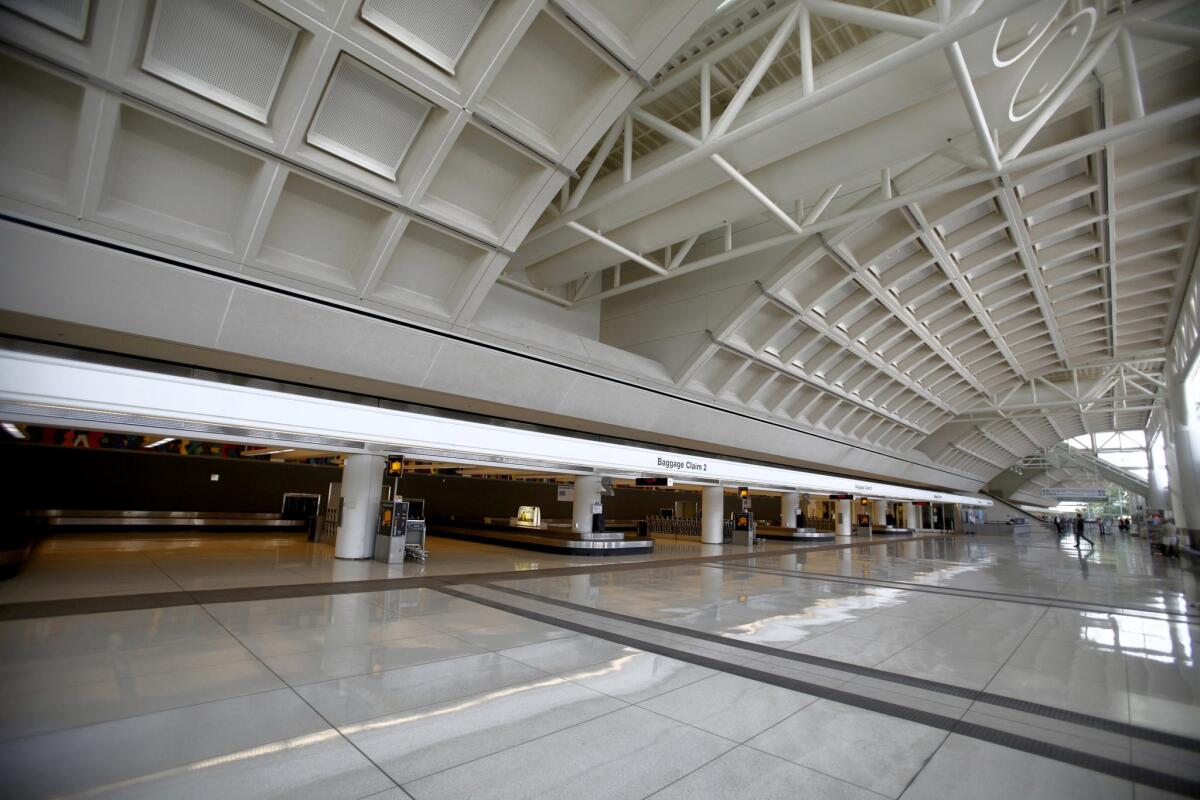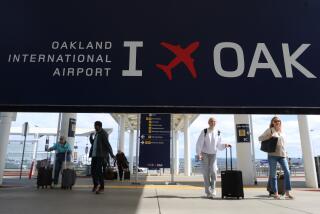Inland Empire seeks to regain control of Ontario airport from L.A.

Accusing Los Angeles of breaking agreements to foster a network of regional air centers and build up L.A./Ontario International, Inland Empire officials went to court last week to regain control of the struggling airport.
In a motion filed Friday, the city of Ontario asked a Riverside County Superior Court judge to order Los Angeles to relinquish the airport — the latest development in a year-old lawsuit and long-running political battle.
Besides legal arguments, the city’s court papers reference internal communications and other documents to portray Los Angeles leaders as insulting and rudely dismissive of Ontario’s desire to protect the airport from decline as resources were directed to improve Los Angeles International.
Citing records that include emails, deposition testimony and meeting transcripts, the motion states that the chief operating officer for Los Angeles World Airports once referred to the Inland Empire as the “inbred Inland Empire,” while Executive Director Gina Marie Lindsey characterized the effort to share air traffic with other airports as “a silly waste of time” and “a politically driven mantra to appease LAX neighbors.”
Regionalizing commercial air traffic has long been a goal of noise- and traffic-conscious residents surrounding LAX. Many have fought its physical expansion for years and gotten Los Angeles officials to agree to spread the growth in passengers to other airports like Ontario and Palmdale, which has since closed.
But in court papers, Ontario’s attorneys say that LAWA — L.A.’s airport agency — has failed to comply with a 1967 agreement to both operate Ontario International and do its best to attract service to the airport, where passenger volumes plunged from 7.2 million in 2007 to about 4 million last year.
The city also says that LAWA has ignored a 2006 court settlement requiring the agency to regionalize or encourage the growth of air traffic at Ontario and Palmdale. That settlement stemmed directly from a lawsuit challenging plans to expand LAX.
Ontario alleges that instead of fulfilling their legal obligations, Lindsey and her lieutenants turned away from regionalization, put up a façade of compliance and abandoned Ontario to concentrate on a multibillion-dollar modernization of LAX.
“As a result of that neglect and mismanagement, Ontario is on the brink of ruin,” Inland Empire officials assert in Friday’s court filing. “Even so, Los Angeles insists on continuing to operate Ontario in perpetuity.”
According to case records, Michael Collins, an assistant to Lindsey, advised her in January 2010 that regionalization could drain business from LAX and leave the city of Los Angeles “in deep trouble.” He also said the settlement goal of shifting air traffic away from Los Angeles “has to be seen as a form of economic suicide.”
The lawsuit says that similar views were held by Lindsey, former airport commissioner Alan Rothenberg and former Los Angeles City Councilman Richard Alarcon, who stated while in office that “it would be a sin” to relinquish control of Ontario and permit that airport to “steal our business.” Alarcon added that “we need to protect LAX as the prime regional airport,” court papers state.
Airport officials declined to comment on the lawsuit, saying it was their policy not to discuss pending litigation.
Ontario’s request to Superior Court Judge Gloria Connor Trask is a response to a recent motion filed by LAWA attorneys that seeks to knock out Ontario’s allegations. A hearing has been set for Oct. 31.
Los Angeles, which acquired Ontario International in 1985, says it vastly improved the facility, turning it into one of the best and fastest-growing regional airports in the nation. But then the recession hit.
Among other things, Los Angeles contends that Ontario’s attempt to cancel its agreements and regain control of the airport was brought to court decades too late, violating the statute of limitations.
In court papers, Ontario’s attorneys concede that LAWA lived up to its agreements before the economic downturn. Lindsey, they allege, then pushed Ontario International aside in favor of developing LAX.
For example, according to depositions quoted in the lawsuit, Mark Thorpe, a former LAWA marketing director, said that adding airline service to Ontario was a goal when he was hired. But Lindsey told him in 2008 to focus more on LAX and less on Ontario.
Court papers state that airport officials stopped trying to attract airlines to Ontario because “they did not have anything to sell” and gutted the airport’s advertising and marketing budget while approving millions of dollars to promote LAX.
Today, Ontario has lost more than 40% of its passengers while LAX has recovered from the recession and is headed for a record 70 million passengers this year.
Case documents further state that LAWA refused to cancel or reduce airport fees for airlines at Ontario and failed to honor a request by then-Mayor Antonio Villaraigosa to pass on $7.3 million in annual savings to Ontario International from the closure of Palmdale in 2008.
“Not only has Los Angeles expressed its lack of respect for Ontario and surrounding communities, it clearly has no interest in actively promoting Ontario in the future,” lawsuit records state.
According to Friday’s filings, Steve Martin, LAWA’s chief operating officer, referred to the Inland Empire as the “inbred Inland Empire” in April 2013 and described as “entertaining” Ontario’s legal claim that was lodged that month.
Ontario’s court papers assert that during a presentation to the Los Angeles Board of Airport Commissioners this year, Martin referred to board-authorized improvements at Ontario International “as a storied tale of charity toward the Inland Empire.”
The lawsuit also contends that Martin and Jess Romo, Ontario International’s manager, proposed putting up billboards this year to “show some effort that we are marketing” the airport and to “look like we are doing something to ward off bullets from the city of Ontario.”
The case documents say that Martin, however, did not want to spend much money, stating, “We will get no more credit for $500,000 of billboards as $150,000, and we will get just as much positive coverage for five high-profile billboards as 25 that never get media attention.”
Follow @LADeadline16 for aviation news
More to Read
Start your day right
Sign up for Essential California for news, features and recommendations from the L.A. Times and beyond in your inbox six days a week.
You may occasionally receive promotional content from the Los Angeles Times.







